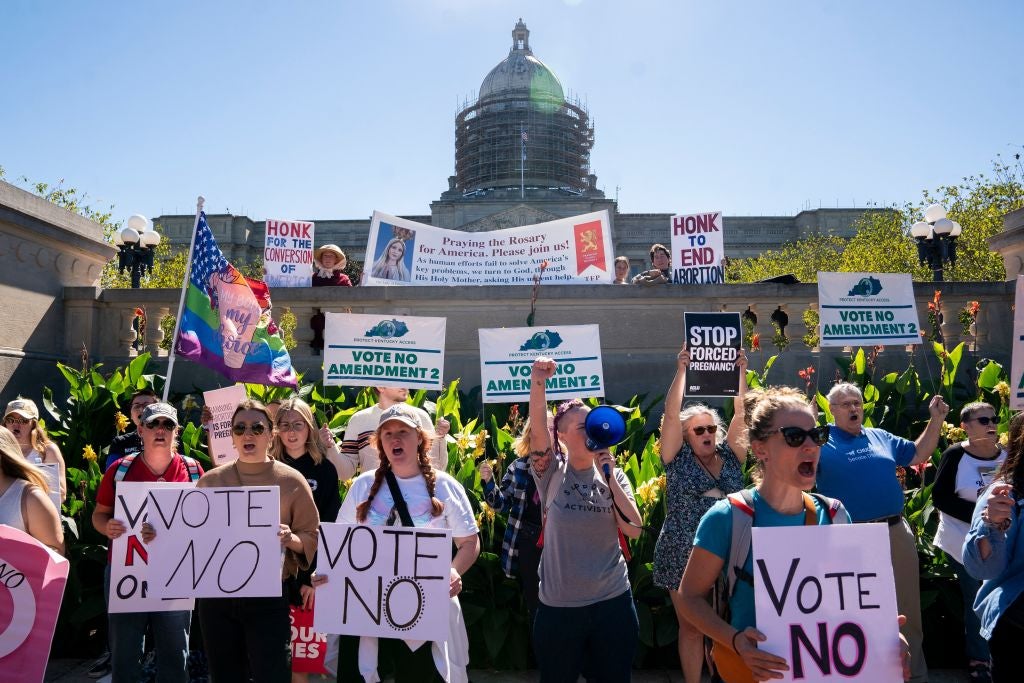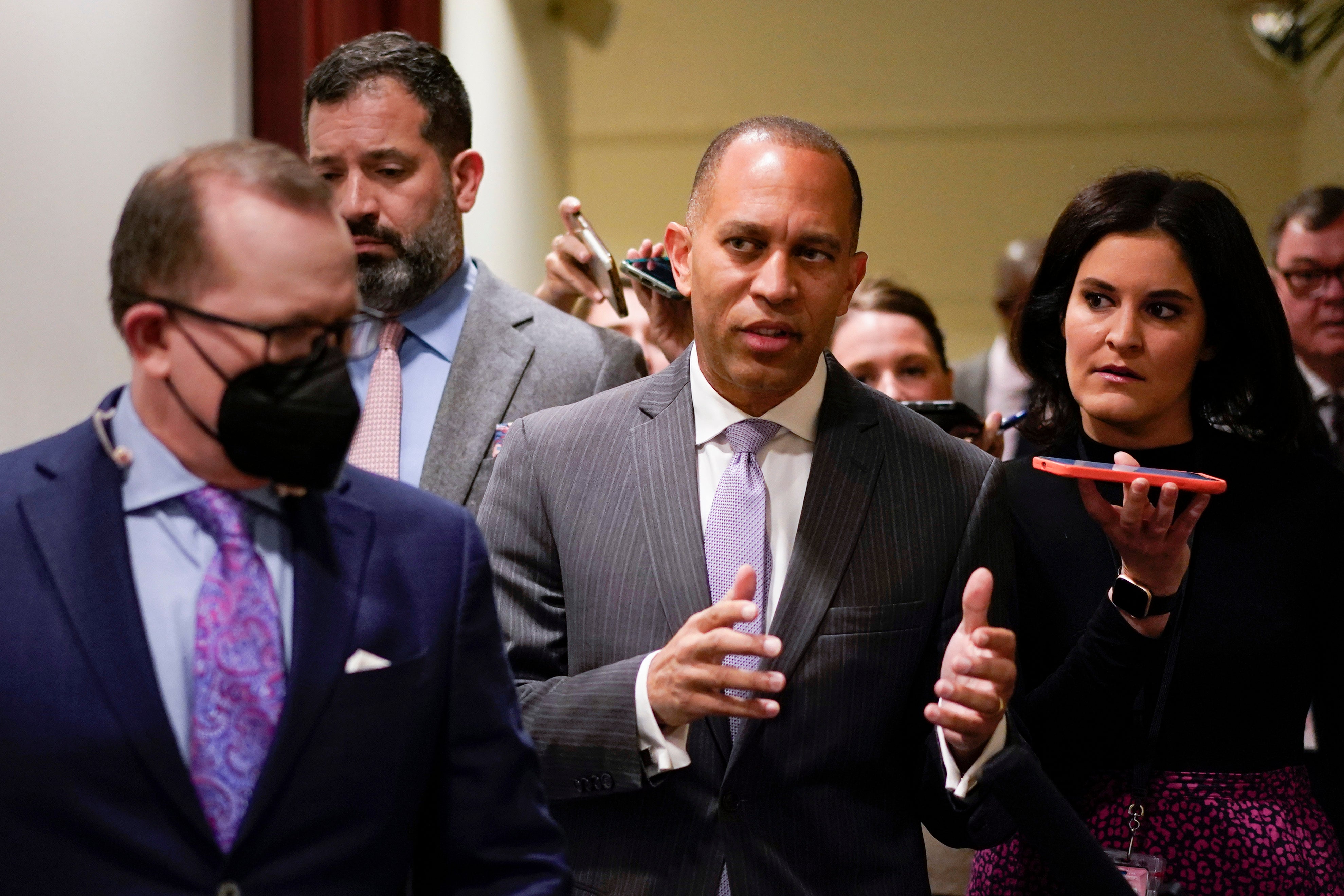
Democrats may have lost the House of Representatives in the midterm elections, but that doesn’t mean Americans across the country won’t see a wave of progressive legislative victories take effect over the next few years.
After what pundits predicted would be a stunning rebuke of President Joe Biden and the left ended up being a rejection of the efforts to relitigate the 2020 election, the upper chamber of Congress remains firmly in Democratic hands and may even see the president’s party strengthening its majority after a runoff concludes next month. The House of Representatives, meanwhile, flipped to Republican control but only by a razor-thin margin that may prove impossible for the incoming speaker, Kevin McCarthy, to manage effectively.
Split control of the US Congress typically means that little will get done at the national level. Already the two parties are preparing for a battle over raising the debt ceiling, which will likely mean Republican demands for budget cuts or reforms to government programs like Social Security, which President Joe Biden has said is firmly off the table.
But thanks to a wave of victories for progressive activists in states around the country, millions of Americans will still be affected by changes that affect their daily lives which otherwise would go by the wayside, sacrificed to the upcoming two years of likely total inaction in Washington.
This month’s midterm elections saw not only Democratic candidates win a number of key races — the Pennsylvania Senate race and the Arizona gubernatorial race, among others — it also saw progressive and Democratic activists rallying voters with a wave of citizen-led ballot initiatives encompassing a whole host of issues that Democrats have previously hoped to address at the federal level. Issues including the minimum wage, codification of abortion and contraceptive rights, and strengthening voting rights were all addressed by voters this midterm cycle, and led to a slew of victories for the left including in some surprising places.
In conversations with some of those victorious campaigners in recent days, it was clear that many believe that the legislation which Democratic candidates claim to support is often more popular than those candidates themselves.
That was the sense that some activists in Maryland had after a ballot initiative to legalise recreational marijuana passed in the state; “Yes” votes swamped opposition to the measure, winning by nearly 33 percentage points. A priority for left-leaning criminal justice reform activists, it just slightly overperformed the gubernatorial campaign of Democratic candidate Wes Moore, who cleanly defeated his Republican opponent Dan Cox.
Kris Furnish, an organiser with the campaign to pass Question 4, seemed relieved with their victory but frustrated that deep-blue Maryland’s Democrats had not used their veto-proof majority in the state Senate to force the issue through the legislature via normal means at any time in recent years over the opposition of GOP Governor Larry Hogan.
“They could have passed this any time they wanted,” she told The Independent. “I think sometimes politicians use these issues to drive voters out to the polls.”
The big issue that drove more Americans to the polls in 2022 than it ever had before was the issue of abortion. The decision to overturn Roe v Wade by the Supreme Court earlier this year was met with disbelief, shock and rage by those who support abortion rights, especially younger Americans who had never lived in a time when those rights were not protected. And despite a wave of younger voters at the polls this year helping Democrats save their Senate majority, the GOP’s slim House majority means that codifying abortion rights under the next Congress is likely impossible.

But voters in five states still addressed that issue this year, as initiatives seeking to either codify abortion rights in state constitutions (or in Kentucky’s case strip that right from the constitution) were on the ballot. Abortion rights activists won in all five cases, with voters in Vermont, California, Michigan all choosing to add language to their state constitutions enshrining the right against Republican bans. In Kentucky, the effort to strip the right from the constitution failed, and in Montana voters rejected a plan to require medical care for any infant born alive after an abortion, induced labour, or any other medical procedure. Billed as legislation to protect newborns, that initiative would have imposed harsh penalties on doctors and nurses who did not attempt medical treatment even on babies with zero chance of survival.
In Michigan, Democratic groups rallied in support of a ballot initiative known as Proposal 3 months before the Supreme Court’s abortion ruling came down, resulting in a more than 13-point victory on Election Day. It was a wide-ranging measure which enshrined not only the right to an abortion but the general right of “reproductive freedom”, defined as an encompassing terms that includes the right to make all decisions surrounding the issue of reproduction: Contraception, abortion, postpartum care, and many others. The measure wasn’t just victorious; it outperformed the reelection victory of Gretchen Whitmer, the state’s Democratic governor, who shut out election-denier Tudor Dixon by 11 percentage points.
Energised by their victory, supporters of the Michigan proposal say that these initiatives are the best way to take immediate action on progressive issues in the minority of states that allow such measures.
“I think we can’t sit back and rely on the federal government to do this,” said Dr Rob Davidson, executive director of the Michigan-based Committee to Protect Healthcare. “I think we have to go find those places like we had in Michigan where we can try to get you know, physician’s voices involved with other members of coalitions to secure these rights.”
Michigan voters also decided on the fate of a constitutional amendment to expand voting rights in the state, and delivered another clear victory for the left on that issue. A proposal to establish early voting, enshrine existing ID requirements (which do not prevent residents from voting without an ID), and authorising ballot drop boxes won easily, 60 per cent to 40 per cent.
Activists involved with that campaign declared that the results were evidence that their stance on voting rights — namely that access to the vote should be expanded through multiple avenues — was the broadly popular position among the electorate.
“Voters, regardless of who they support as a candidate, we all want every voter to have access to the ballot,” said Nancy Wang, executive director of Voters Not Politicians, a nonpartisan voting rights group based in the state. “We want convenient access to voting. We want to prevent partisans from interfering with our elections, for example, by hijacking canvassing boards…So there’s a lot of commonalities still, even though in politics we see a lot of polarization.”
And she hopes her campaign’s success can be a model for others.
“We’re hoping that one of the things that we can serve as … an example for how people can come together and take back our political power,” said Ms Wang. “I think there’s lots of opportunity for people to take their power back and to kind of make our elections fair for all voters, even as our politics and politicians are being driven farther apart.”
Activists in the Michigan races especially described statewide ballot measure campaigns, ones surrounding hotly contested issues, as expensive projects. But some contest that argument, suggesting that it may reflect an old-school way of doing politics that costs more money but may not be the most effective in the end.
Ryan O’Leary, an organiser behind the Initiative 82 campaign in Washington DC to raise the minimum wage for tipped employees, told The Independent that his team achieved a stunning 47-point margin of victory despite opposition from restaurant groups by spending less than $30,000 throughout the entirety of their campaign, not including the costs of initial signature-gathering canvassing.
“I think it involves a lot of grassroots organising,” said Mr O’Leary in an interview, noting that their largest donation came in the form of a $110,000 shipment of bitter-tasting chocolate bars.
He added that canvassers with the local chapter of the Democratic Socialists of America and other grassroots groups hit different wards of the city every weekend, while focusing on areas of high traffic and speaking directly to restaurant workers. In the end, Initiative 82 came close to winning by the same margin as DC’s widely-popular mayor, Muriel Bowser, who became the first leader of the nation’s capital to win a third term since Marion Barry. The ballot question did outperform Elissa Silverman, a progressive incumbent who lost the race for a seat on the city council after being outperformed among the city’s black and working class neighbourhoods.
In the end, the best chance for progressives and left-leaning activists around the country to see significant gains over the next two years may be through ballot initiatives, as they see Joe Biden’s legislative agenda stalled by Kevin McCarthy and the Republican House majority.
But there may be another lesson for Democrats here: Embrace the party’s grassroots and the energy that is generated naturally by voter enthusiasm for popular ideas. It’s a lesson that Republicans are learning the hard way after seeing their dreams for a Senate majority die in Arizona and Nevada and were bruised by a humiliating defeat in Pennsylvania.

Just ask Rick Scott, head of the Senate GOP’s campaign arm, who told Fox’s Tucker Carlson last week when the right-wing host demanded an explanation other than a rejection of the very voter fraud lies that Mr Carlson himself embraced on-air.
"I think we didn’t have enough of a positive message. We said everything about how bad the Biden agenda was. It’s bad, the Democrats are radical, but we have to have a plan of what we stand for,” said the Florida senator.
A number of ballot measure campaigns are already underway in anticipation of the 2024 election. In California, activists want to raise the minimum wage statewide to $18 an hour; in Nevada, they want voters to consider a ranked-choice system similar to the one recently enacted in Alaska.
More are inevitably in the works. It will be up to Democratic leaders in Washington as well as their individual members around the country whether they want to ride that wave or stand on their own in the face of Donald Trump as he seeks vengeance against his political enemies, the pomp and prestige of the Oval Office, and the invaluable legal protections that follow.







